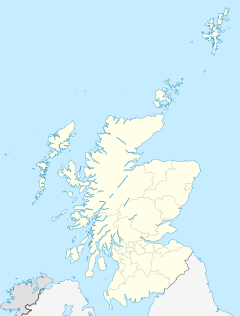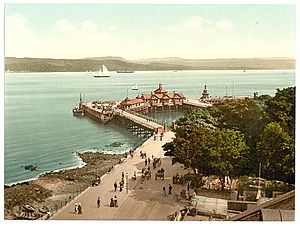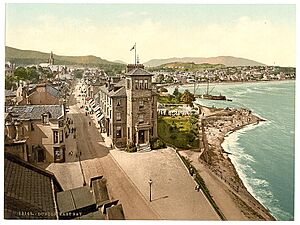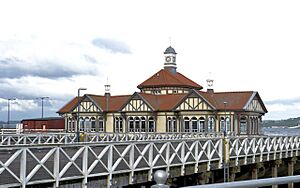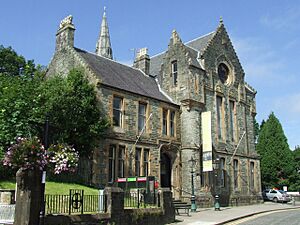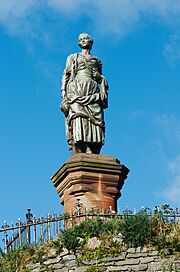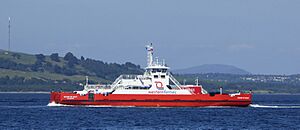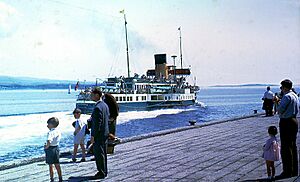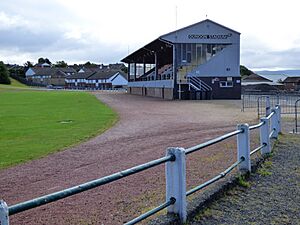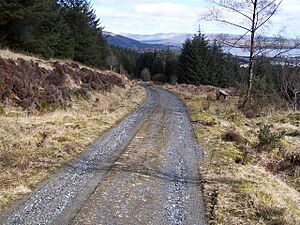Dunoon facts for kids
Quick facts for kids Dunoon
|
|
|---|---|
| Town | |
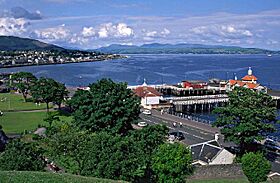 Harbour at Dunoon, looking north over Dunoon Pier to the Firth of Clyde and Dunoon Harbour from Castle Hill (1997) |
|
| Population | 7,660 (2020) |
| OS grid reference | NS173769 |
| • Edinburgh | 67 mi (108 km) |
| • London | 364 mi (586 km) |
| Council area |
|
| Lieutenancy area |
|
| Country | Scotland |
| Sovereign state | United Kingdom |
| Post town | DUNOON |
| Postcode district | PA23 |
| Dialling code | 01369 |
| EU Parliament | Scotland |
| UK Parliament |
|
| Scottish Parliament | |
Dunoon is a town located on the Cowal Peninsula in the west of Scotland. It sits on the western shore of the upper Firth of Clyde. Dunoon is part of the council area of Argyll and Bute and has its own local council. It used to be a special type of town called a burgh until 1976, which meant it had certain rights and self-governance.
In its early days, Dunoon's history often involved two powerful families: the Lamonts and the Campbells, who sometimes had conflicts. The town became a very popular holiday spot when people traveled by steamships on the Firth of Clyde. People from Glasgow often called this trip "doon the watter" (down the water). However, as roads and railways got better, and people started flying to other countries for holidays, fewer visitors came to Dunoon.
In 1961, during the Cold War, Dunoon became home to the United States Navy. But in 1992, after the Cold War ended, the US Navy closed its base nearby. This caused economic problems for Dunoon. Since then, the town has been working to attract tourists again. It promotes outdoor activities, wildlife watching, and hosts many festivals and competitions. The biggest event each year is the Cowal Highland Gathering, which has been held since 1894. The Royal National Mòd, a celebration of Scottish Gaelic culture, has also taken place here many times.
Contents
Dunoon's History
Dunoon Castle was built in the 12th century on a small hill next to the Firth of Clyde. It became a royal castle, and the Campbell family were its hereditary keepers. Mary, Queen of Scots, visited Dunoon Castle on July 26, 1563. Sadly, in 1646, a terrible event known as the Dunoon massacre happened here, involving conflict between the Campbell and Lamont clans. The castle was later destroyed in 1685 during a rebellion.
In the early 1800s, Dunoon was a much smaller place. Its main street, Argyll Street, didn't go all the way to the pier like it does today. The land where Dunoon Burgh Hall now stands was an open field. By 1870, Argyll Street was mostly finished as we see it now. Dunoon became a very popular place for holidays, with many hotels and businesses.
Many of the town's early large houses had their own private swimming areas. In 1868, a guide mentioned different bathing spots for ladies and gentlemen around the town.

During the World Wars, Dunoon was an important part of the Firth of Clyde's defenses. An anti-submarine barrier was placed across the water. Gun positions were set up on Castle Hill and at Ardhallow Battery to protect the area.
In 1961, as the Cold War became more intense, the Holy Loch nearby became very important. The U.S. Navy ship USS Proteus arrived, bringing Polaris ballistic missiles and nuclear submarines to Sandbank. This made Dunoon a "garrison town," meaning it had a large military presence.
However, in 1991, after the Soviet Union broke apart, the Holy Loch base was no longer needed. The last submarine ship left in March 1992. This closure caused a big economic challenge for Dunoon and the surrounding area.
Places of Worship
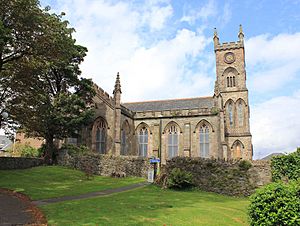
Today, Dunoon has several churches, including:
- Church of Scotland: St John's Church
- Roman Catholic: Our Lady and St Mun's Church
Other churches include:
- Cowal Baptist Church
- Dunoon Baptist Church Centre
- Holy Trinity Episcopal Church
- Kingdom Hall of Jehovah's Witnesses
Historical Churches
There is evidence that Dunoon had a bishop's seat in the late 1400s. The site of the Bishop's Palace is now a playground for Dunoon Primary School.
Some churches that are no longer in use include:
- High Kirk, closed in 2023
- St Cuthbert's Church, demolished in 1994
- Dunoon Free Church (built 1843), closed in 2021
Culture and Attractions
Architecture
Dunoon Pier
Dunoon's Victorian pier was made longer between 1896 and 1898. In 2005, a breakwater was built next to the pier to protect it from strong waves. A new ramp was also added for ferries that carry cars.
Before June 2011, the pier was used daily by Caledonian MacBrayne ferries, which carried both people and cars to Gourock. Now, a different ferry service, Argyll Ferries (owned by Caledonian MacBrayne), carries only foot passengers and uses the breakwater for docking. The famous paddle steamer Waverley also visits Dunoon and docks at the breakwater. The pier was partly fixed up in 2015 and now serves as a tourist attraction with meeting rooms.
Burgh Hall
Dunoon Burgh Hall opened in 1874. It was designed by a famous architect named Robert Alexander Bryden. This building, in the Scottish baronial style, used to hold town offices and a large hall for events. The building was renovated and reopened in June 2017. It is now a place for art exhibitions, performances, and community gatherings, with a gallery, theatre, workshop space, garden, and café.
Landmarks and Attractions
Mary Campbell, also known as "Highland Mary," was born near Dunoon. She was a special friend of the famous Scottish poet Robert Burns. A statue of "Highland Mary" was put up in 1896 on Castle Hill, looking over the water.
The war memorial for Dunoon is in the Castle Gardens, also overlooking the pier.
The Queen's Hall is a large building for many different events in Dunoon. It was opened by Queen Elizabeth II in 1958. It has several rooms and a main hall with a stage. Many famous music groups and comedians have performed here, including Pink Floyd and Blur. The Queen's Hall was closed for a big renovation in 2015 and reopened in August 2018.
The Riverside Swim and Health Centre has a 25-meter indoor swimming pool and other facilities. Dunoon Library is located in the renovated Queen's Hall.
A small group of rocks called the Gantocks are off the coast of Dunoon. A navigation beacon, built in 1886, stands on them to guide ships.
The Clan Lamont Memorial, also called the Dunoon Massacre Memorial, is near Castle Hill. It was put up in 1906 to remember the Dunoon massacre of 1646.
You can see many animals in the local area, such as seals, otters, dolphins, basking sharks, roe deer, red deer, red squirrels, and many kinds of birds.
The Castle House Museum is open in the summer. It has information and displays about the history of Dunoon and the Cowal peninsula.
Festivals

The Cowal Highland Gathering, which started in 1894, is a huge event that brings competitors and visitors from all over the world. It happens every year on the last weekend of August at Dunoon Stadium.
Cowal Open Studios, held for two weeks in September, lets you visit the workplaces of artists around Dunoon and Cowal.
Cowalfest celebrates outdoor activities like walking around Dunoon for ten days in October.
Since the 1930s, Dunoon has hosted the Royal National Mòd several times, most recently in 2018.
In 2013, the first Dunoon Film Festival was held. It lasted three days and showed a TV series called Your Cheatin' Heart, which had not been seen on television since 1990.
Getting Around Dunoon
Dunoon can be reached by road and by ferry. You can also connect to train services from a nearby town.
Road Travel
Dunoon is located at the southern end of the A815 road. This road connects to the A83 further north, allowing you to drive to Dunoon from places like Glasgow, Oban, and Campbeltown.
Ferry Services
Two ferry companies offer services to Dunoon from Gourock, Inverclyde.
Caledonian MacBrayne
This ferry service, owned by the Scottish Government, carries only foot passengers between Dunoon Breakwater and Gourock pier. From Gourock, you can easily connect to the national train network.
| Preceding station | Ferry | Following station | ||
|---|---|---|---|---|
| Terminus | Caledonian MacBrayne Ferry |
Gourock |
Western Ferries
A local company, Western Ferries (Clyde) LTD, carries both cars and foot passengers between Hunters Quay (near Dunoon) and McInroy's Point on the A770.
| Preceding station | Ferry | Following station | ||
|---|---|---|---|---|
| Terminus | Western Ferries Ferry |
McInroy's Point |
Connecting Travel For people traveling without cars, a ScotRail train service from Gourock Pier connects to the national train network at Glasgow Central.
Bus Services
Buses in Dunoon and the surrounding area are run by West Coast Motors. Route 486 goes from Dunoon town centre to Inveraray, where you can connect to other bus services for places like Campbeltown, Oban, and Glasgow. Route 478 runs from Dunoon Pier to Portavadie six days a week.
Historical Transport

Dunoon grew a lot because of steamships. In the early 1800s, it was just a small village. But as steamships became popular, more people visited. A long jetty (a pier) was built in 1835. From 1812 until the late 1960s, thousands of holidaymakers traveled "doon the watter" from Glasgow to Dunoon and other towns on the Firth of Clyde.
In 1868, you could take day trips by steamer from Dunoon to many different places like Arran, Rothesay, and Loch Lomond. Today, only one of these old "Clyde steamers," the Waverley, still operates and visits Dunoon during the summer.
Education
Dunoon has three primary schools: Dunoon Primary School on Hillfoot Street, St Muns Primary School on Pilot Street, and Kirn Primary School on Park Road.
Dunoon Grammar School is located on Ardenslate Road in Kirn.
The University of the Highlands and Islands' Argyll College also has a campus in Dunoon, located in the West Bay.
Sports and Recreation
National Cycle Route 75
Dunoon is part of the NCR75, a cycling route that goes from Edinburgh to Tarbert on the Kintyre peninsula. This route is looked after by sustrans.
Dunoon Stadium
Dunoon Stadium is the town's main sports ground. It used to be the largest amateur football stadium in Scotland. Now, it's the main place for the Cowal Highland Gathering.
The Dunoon Youth Football League (DYFL), started in 1981, teaches football skills to children aged 4 to 17. They have their own clubhouse at Dunoon Stadium.
Cowal Rugby Club was formed in 1976. Dunoon Amateurs F.C. started in 1975 and plays football at Dunoon Stadium. Dunoon Camanachd, a shinty team, was created in 2015.
Cowal Golf Club is on the hillside above Kirn. It was founded in 1891 and used to have eighteen holes. Due to financial reasons, some land was sold in 2020, and it is now a twelve-hole course.
Dunoon has two bowling clubs: Dunoon–Argyll Bowling Club and Bogleha' Bowling Club.
In 2006 and 2007, the town hosted a six-a-side "swamp football" tournament, which was very popular.
Castle Tennis Club is in the town's Castle Garden and has four tennis courts.
Every June, Dunoon hosts the Argyll Rally, a car racing event on closed public roads. It's part of the Scottish Rally Championship.
Walking Trails
There are many trails for walking, running, and mountain biking in the hills around Dunoon. Corlarach Hill has marked routes for these activities, located near the Bishop's Glen.
Puck's Glen is a popular short walk near Benmore Botanic Garden. This garden is about 7 miles (11 km) north of Dunoon and has some of the tallest trees in Britain, including giant redwood trees over 120 feet (37 meters) high. Puck's Glen has a stream with bridges, surrounded by mossy rocks and dense trees.
Morag's Fairy Glen is another short walk along the Berry Burn, located on the hill behind the West Bay area of Dunoon.
The Bishop's Glen Reservoir trail follows the edge of a reservoir that used to supply fresh water to Dunoon. It's now a place for fly fishing. You can also access the hills behind Dunoon from this trail.
Media
Dunoon's local weekly newspaper is the Dunoon Observer and Argyllshire Standard, which started in 1871.
Dunoon Community Radio began broadcasting in 2009. It's run by volunteers and broadcasts on 97.4 FM from the Dunoon Observer building.
Notable People
Many interesting people have connections to Dunoon, including:
- Virginia Bottomley, a politician
- Robert Alexander Bryden, an architect who studied in Dunoon
- Mary Campbell, known for her connection to poet Robert Burns
- MT Carney, a businesswoman
- Donald Caskie, a minister who studied in Dunoon
- William Fraser, an architect who lived in Dunoon
- Stewart Houston, a footballer born in Dunoon
- Sir Harry Lauder (1870–1950), a famous entertainer who had a large house near Dunoon
- Neil MacFarlane, a footballer born in Dunoon
- Mackintosh MacKay, a minister and Gaelic scholar in Dunoon
- Sylvester McCoy, an actor
- George Robertson, a politician who studied in Dunoon
- Arabella Scott, a suffragette born in Dunoon
- Muriel Scott, a suffragette whose family lived in Dunoon
- John Smith, a politician who studied in Dunoon
- Neil Warnock, a football manager
- Brian Wilson, a politician
Images for kids
-
Pipe band at the Cowal Highland Gathering
-
Dunoon from above the Firth of Clyde, looking west
-
Highland Mary statue
Geography and Climate
Dunoon is located on the west coast of the upper Firth of Clyde. It's on the eastern side of the Cowal peninsula, which is shaped a bit like a claw.
Much of the Cowal peninsula is covered by forests, especially in the northern parts. The Argyll Forest Park was created in 1935 and covers a large area to the north and northwest.
Climate
Like the rest of the British Isles, Dunoon has a maritime climate. This means it has cool summers and mild winters. It's a very wet part of the country, with a lot of rain each year, almost 2400 mm (94 inches).
The highest temperature recorded since 1960 was 29.6°C (85.3°F) in July 1983. The lowest was -13.9°C (7.0°F) in January 1982.
| Climate data for Benmore Botanic Gardens 12m asl, 1971–2000, extremes 1960– (Weather station 7 mi (11 km) to the North of Dunoon) | |||||||||||||
|---|---|---|---|---|---|---|---|---|---|---|---|---|---|
| Month | Jan | Feb | Mar | Apr | May | Jun | Jul | Aug | Sep | Oct | Nov | Dec | Year |
| Record high °C (°F) | 14.4 (57.9) |
14.5 (58.1) |
17.2 (63.0) |
23.6 (74.5) |
27.0 (80.6) |
28.9 (84.0) |
29.6 (85.3) |
29.0 (84.2) |
25.1 (77.2) |
21.7 (71.1) |
16.5 (61.7) |
14.2 (57.6) |
29.6 (85.3) |
| Mean daily maximum °C (°F) | 6.5 (43.7) |
6.8 (44.2) |
8.6 (47.5) |
11.4 (52.5) |
14.9 (58.8) |
16.8 (62.2) |
18.4 (65.1) |
18.0 (64.4) |
15.3 (59.5) |
12.2 (54.0) |
8.9 (48.0) |
7.2 (45.0) |
12.1 (53.8) |
| Mean daily minimum °C (°F) | 1.0 (33.8) |
1.3 (34.3) |
2.2 (36.0) |
3.4 (38.1) |
5.8 (42.4) |
8.5 (47.3) |
10.7 (51.3) |
10.4 (50.7) |
8.6 (47.5) |
6.1 (43.0) |
2.9 (37.2) |
1.7 (35.1) |
5.2 (41.4) |
| Record low °C (°F) | −13.9 (7.0) |
−11.1 (12.0) |
−11.1 (12.0) |
−4.4 (24.1) |
−2.5 (27.5) |
−0.6 (30.9) |
2.2 (36.0) |
2.6 (36.7) |
−0.9 (30.4) |
−4.1 (24.6) |
−6.8 (19.8) |
−11.5 (11.3) |
−13.9 (7.0) |
| Average precipitation mm (inches) | 298.76 (11.76) |
214.43 (8.44) |
233.63 (9.20) |
119.48 (4.70) |
105.12 (4.14) |
108.54 (4.27) |
127.66 (5.03) |
160.85 (6.33) |
220.49 (8.68) |
257.6 (10.14) |
257.82 (10.15) |
282.98 (11.14) |
2,387.36 (93.98) |
| Source: Royal Dutch Meteorological Institute | |||||||||||||
See also
 In Spanish: Dunoon para niños
In Spanish: Dunoon para niños
 | Selma Burke |
 | Pauline Powell Burns |
 | Frederick J. Brown |
 | Robert Blackburn |


